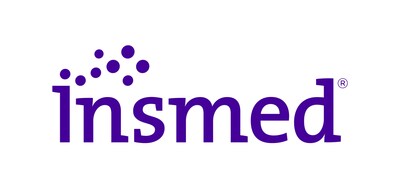Insmed Announces Positive Topline Results from Phase 2b Study of Treprostinil Palmitil Inhalation Powder (TPIP) as Once-Daily Therapy in Patients with Pulmonary Arterial Hypertension
Rhea-AI Summary
Positive
- Achieved statistically significant 35% reduction in pulmonary vascular resistance (primary endpoint)
- Met all secondary endpoints with significant improvements in walk distance and cardiac stress biomarkers
- High patient compliance with 75% reaching maximum dose and 90% study completion rate
- Demonstrated 24-hour sustained efficacy with once-daily dosing
- Strong safety profile with manageable side effects
Negative
- Higher rate of treatment-emergent adverse events in TPIP group (88.4%) vs placebo (75.8%)
- 5.8% discontinuation rate in TPIP group due to adverse events compared to 0% in placebo
- Phase 3 trials not starting until late 2025/early 2026, indicating longer timeline to potential approval
News Market Reaction
On the day this news was published, INSM gained 28.65%, reflecting a significant positive market reaction.
Data tracked by StockTitan Argus on the day of publication.
–The Study Met Primary and All Secondary Efficacy Endpoints–
- Statistically Significant
35% Placebo-Adjusted Reduction from Baseline in Pulmonary Vascular Resistance for the Primary Endpoint (p<0.001) - 35.5 Meter Placebo-Adjusted Improvement in Six-Minute Walk Distance for the Secondary Efficacy Endpoint (p=0.003)
60% Placebo-Adjusted Reduction from Baseline in NT-proBNP Concentrations for the Secondary Efficacy Endpoint (p<0.001)- Results Were Assessed Approximately 24 Hours After Administration, Demonstrating Sustained Benefit Throughout the 24-Hour Dosing Period
–TPIP Was Well Tolerated in the Study, with
–Insmed to Immediately Engage with FDA to Inform Phase 3 Trial Design with Studies Expected to Begin Before End of 2025 for PH-ILD and in Early 2026 for PAH–
–Insmed to Host Investor Call at 8:00 AM ET on Tuesday, June 10, 2025–
Based on these results, Insmed will immediately engage with the
"The statistically significant and clinically meaningful results shown with TPIP in pulmonary arterial hypertension mark a potential breakthrough for patients and the future of prostanoid therapy," said Gene Sullivan, M.D., Chief Product Strategy Officer of Insmed. "TPIP was designed with the goal of fully harnessing the potential of treprostinil and providing meaningful benefit to patients. These unprecedented Phase 2b results unequivocally demonstrate TPIP's potential to be a highly effective and well-tolerated once-daily prostanoid therapy for the treatment of PAH across disease severities and background treatment regimens. We look forward to expanding upon these results in the upcoming Phase 3 program."
The study was conducted at 44 sites globally, and a total of 102 patients were randomized 2:1 to receive either TPIP (n=69) or placebo (n=33) for 16 weeks. Demographics and baseline characteristics were similar in both study arms. Patients started at a dose of 80 µg once daily (TPIP or matching placebo) and were titrated up to their maximum tolerated dose, or to the maximum allowable dose of 640 µg, once daily over a three-week period, with the possibility of a final dose increase occurring at Week 5. Of the patients treated with TPIP,
Once-daily TPIP therapy was well tolerated in the study. Treatment-emergent adverse events (TEAEs) occurred in
"Today's outstanding results for TPIP represent more than a decade of hard work and the application of innovative chemistry intended to deliver a safe and effective, once-daily inhaled prostanoid therapy for patients with PAH, a devastating, progressive disease," said Martina Flammer, M.D., MBA, Chief Medical Officer of Insmed. "Having met the primary endpoint with high statistical significance, as well as seeing positive results for all secondary efficacy endpoints, we are excited about TPIP's potential to become the prostanoid of choice. Thank you to the many patients and clinicians who participated in this study and contributed to today's historic outcome."
All patients who completed the Phase 2b study were eligible to enroll in the long-term open-label extension, which will evaluate TPIP up to a maximum allowable dose of 1,280 µg once daily. Of the patients who completed the Phase 2b study (n=95),
Results of the Phase 2b study of TPIP in PAH, including exploratory analyses, will be discussed during the Company's investor conference call on Tuesday, June 10, 2025, at 8:00 AM ET and as part of an investor presentation available at https://investor.insmed.com/events.
Conference Call Information
Insmed will host a conference call today at 8:00 AM ET to discuss the TPIP Phase 2b study results in PAH. The call can be accessed by dialing (888) 210-2654 (
A replay of the conference call will be accessible approximately two hours after its completion through Tuesday, June 17, 2025, by dialing (800) 770-2030 (
About TPIP
Treprostinil palmitil inhalation powder (TPIP) is a dry powder formulation of treprostinil palmitil, a treprostinil prodrug consisting of treprostinil linked by an ester bond to a 16-carbon chain. Developed entirely in Insmed's laboratories, TPIP is a potentially highly differentiated prostanoid being evaluated as a once-daily therapy for the treatment of patients with PAH, PH-ILD, and other rare and serious pulmonary disorders. TPIP is administered in a capsule-based inhalation device. TPIP is an investigational drug product that has not been approved for any indication in any jurisdiction.
About the Phase 2b Study
The Phase 2b study of treprostinil palmitil inhalation powder (TPIP) in patients with pulmonary arterial hypertension (PAH) was a randomized, double-blind, multicenter, placebo-controlled study designed to evaluate the efficacy, safety, and pharmacokinetics of TPIP, administered once daily, in patients diagnosed with PAH (World Health Organization Group 1). The study was conducted at 44 sites and enrolled 102 adult participants. Patients started at a dose of 80 µg once daily (TPIP or matching placebo) and were titrated up to their maximum tolerated dose, or to the maximum allowable dose of 640 µg, once daily over a three-week period, with the possibility of a final dose increase occurring at Week 5. Patients self-administered TPIP or placebo using a capsule-based inhalation device. The primary endpoint was change from baseline in pulmonary vascular resistance (PVR) versus placebo at Week 16. Secondary endpoints were six-minute walk distance (6MWD), N-terminal pro b-type natriuretic peptide (NT-proBNP) concentrations, pharmacokinetics, and safety/tolerability. Patients who completed the study could enroll in a long-term open-label extension, with the option to titrate up to a maximum tolerated dose of 1,280 µg once daily.
About Pulmonary Arterial Hypertension
Pulmonary arterial hypertension (PAH) is a serious, progressive, rare disease in which the blood vessels in the lungs narrow or become obstructed, leading to high blood pressure in the pulmonary arteries. The most common symptoms include shortness of breath, chest pain, dizziness or fainting, fatigue, and weakness. It is estimated that approximately 35,000 patients in the
About Insmed
Insmed Incorporated is a people-first global biopharmaceutical company striving to deliver first- and best-in-class therapies to transform the lives of patients facing serious diseases. The Company is advancing a diverse portfolio of approved and mid- to late-stage investigational medicines as well as cutting-edge drug discovery focused on serving patient communities where the need is greatest. Insmed's most advanced programs are in pulmonary and inflammatory conditions, including a therapy approved in the United States, Europe, and Japan to treat a chronic, debilitating lung disease. The Company's early-stage programs encompass a wide range of technologies and modalities, including gene therapy, AI-driven protein engineering, protein manufacturing, RNA end-joining, and synthetic rescue.
Headquartered in Bridgewater,
Forward-looking Statements
This press release contains forward-looking statements that involve substantial risks and uncertainties. "Forward-looking statements," as that term is defined in the Private Securities Litigation Reform Act of 1995, are statements that are not historical facts and involve a number of risks and uncertainties. Words herein such as "may," "will," "should," "could," "would," "expects," "plans," "anticipates," "believes," "estimates," "projects," "predicts," "intends," "potential," "continues," and similar expressions (as well as other words or expressions referencing future events, conditions or circumstances) may identify forward-looking statements.
The forward-looking statements in this press release are based upon the Company's current expectations and beliefs, and involve known and unknown risks, uncertainties and other factors, which may cause the Company's actual results, performance and achievements and the timing of certain events to differ materially from the results, performance, achievements or timings discussed, projected, anticipated or indicated in any forward-looking statements. Such risks, uncertainties and other factors include, among others, the following: the risk that the full data set from the TPIP PAH study or data generated in further clinical trials of TPIP will not be consistent with the topline results of the TPIP PAH study; failure to successfully conduct future clinical trials for TPIP, such as the Company's planned Phase 3 program for TPIP, including due to the Company's potential inability to enroll or retain sufficient patients to conduct and complete the trials or generate data necessary for regulatory approval, among other things; development of unexpected safety or efficacy concerns related to TPIP; failure of third parties on which the Company is dependent to manufacture sufficient quantities of TPIP for clinical needs, to conduct the Company's clinical trials, or to comply with the Company's agreements or laws and regulations that impact the Company's business or agreements with the Company; failure to obtain regulatory approval for TPIP; inaccuracies in the Company's estimates of the size of the potential markets for TPIP or in data the Company has used to identify physicians; expected rates of patient uptake, duration of expected treatment, or expected patient adherence or discontinuation rates, if TPIP is approved; inability of the Company or the Company's third-party manufacturers to comply with regulatory requirements related to TPIP; the Company's inability to obtain adequate reimbursement from government or third-party payors for TPIP or acceptable prices for TPIP, if approved; restrictions or other obligations imposed on us by agreements related to TPIP and failure to comply with our obligations under such agreements; risks that the Company's clinical studies will be delayed or that serious side effects will be identified during drug development; the strength and enforceability of the Company's intellectual property rights or the rights of third parties; and the cost and potential reputational damage resulting from litigation to which the Company may become a party, including product liability claims.
The Company may not actually achieve the results, plans, intentions or expectations indicated by the Company's forward-looking statements because, by their nature, forward-looking statements involve risks and uncertainties because they relate to events and depend on circumstances that may or may not occur in the future. For additional information about the risks and uncertainties that may affect the Company's business, please see the factors discussed in Item 1A, "Risk Factors," in the Company's Annual Report on Form 10-K for the year ended December 31, 2024 and any subsequent Company filings with the Securities and Exchange Commission (SEC).
The Company cautions readers not to place undue reliance on any such forward-looking statements, which speak only as of the date of this press release. The Company disclaims any obligation, except as specifically required by law and the rules of the SEC, to publicly update or revise any such statements to reflect any change in expectations or in events, conditions or circumstances on which any such statements may be based, or that may affect the likelihood that actual results will differ from those set forth in the forward-looking statements.
Contact:
Investors:
Bryan Dunn
Vice President, Investor Relations
(646) 812-4030
investor.relations@insmed.com
Media:
Claire Mulhearn
Vice President, Corporate Communications
(862) 842-6819
media@insmed.com
![]() View original content to download multimedia:https://www.prnewswire.com/news-releases/insmed-announces-positive-topline-results-from-phase-2b-study-of-treprostinil-palmitil-inhalation-powder-tpip-as-once-daily-therapy-in-patients-with-pulmonary-arterial-hypertension-302477053.html
View original content to download multimedia:https://www.prnewswire.com/news-releases/insmed-announces-positive-topline-results-from-phase-2b-study-of-treprostinil-palmitil-inhalation-powder-tpip-as-once-daily-therapy-in-patients-with-pulmonary-arterial-hypertension-302477053.html
SOURCE Insmed Incorporated








